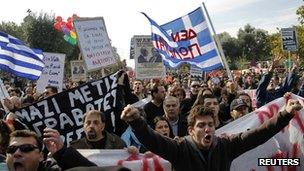Greek PM's big gamble on eurozone deal referendum
- Published
- comments

Greeks have been protesting over the government's austerity measures
The Greeks get to vote.
Suddenly the Greek deal - which was a key plank in last week's eurozone agreement - is up in the air.
Greek Prime Minister George Papandreou surprised his own party and parliament by announcing a referendum and a vote of confidence.
"If the Greek people do not want it," he said, "it will not be adopted."
And if that happens the eurozone will be thrown into fresh uncertainty.
Last week, eurozone leaders agreed a second Greek bailout worth 130bn euros as well as banks agreeing to take 50% losses on their holdings of Greek debt.
His hand was forced by an increasingly ugly mood in the country.
Over the weekend, on an important national day marking Greece's wartime resistance to the axis, the president was heckled and called a traitor.
There were angry demonstrations denouncing the deal.
A poll suggested that 60% of the Greek people viewed the deal negatively even though it takes a chunk out of Greek debt.
The people are weary of austerity and of having decisions about Greece's future taken by unelected officials from the EU and the IMF.
Argued for
It is a big gamble by the Greek prime minister.
He will argue that it is in Greece's national interest to support the deal. Without it, he will say, the country faces default and catastrophe. He will base his campaign on an appeal to patriotism.
But, on recent visits, I have found many people would prefer the chaos of default to years of hardship.
The referendum will only be held after the details of the latest deal with the EU are worked out.
That, of course, will enable the Greek government to barter for softer terms in the hope that may sway the voters.
The Greek government has become adept at playing Europe's leaders.
On the one hand they plead for European solidarity; on the other they know that a Greek default is feared because it could spark contagion in the eurozone.
There will be people who will argue that democracy has once again got in the way of securing a lasting deal to the eurozone debt crisis.
But, in the end, the austerity package in exchange for a new bailout could not just be forced on the Greek people. It will have to be argued for.